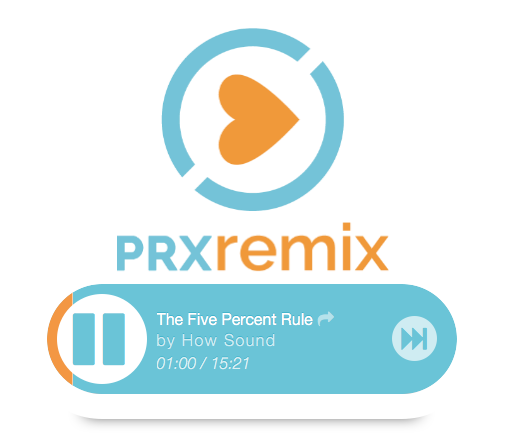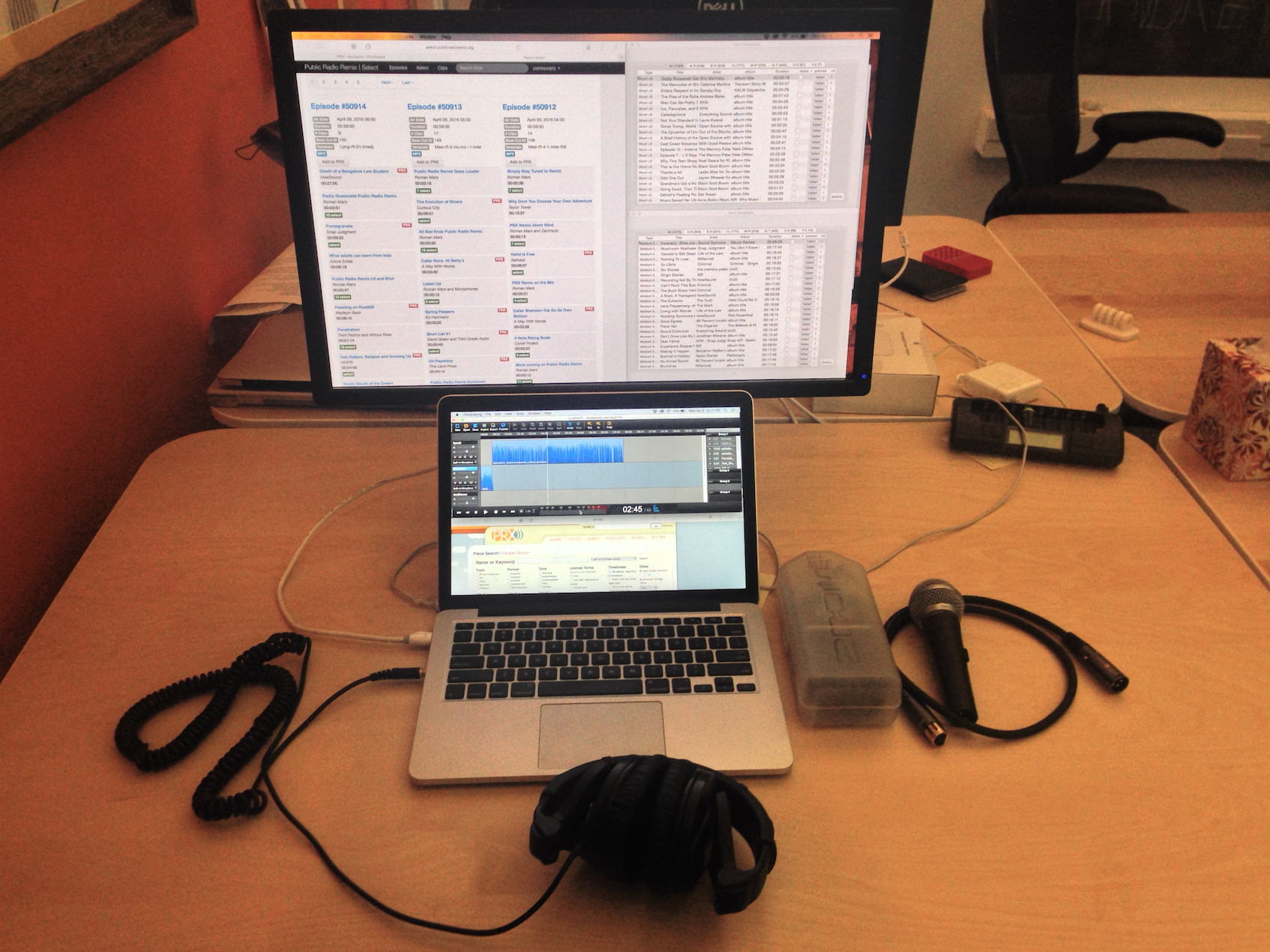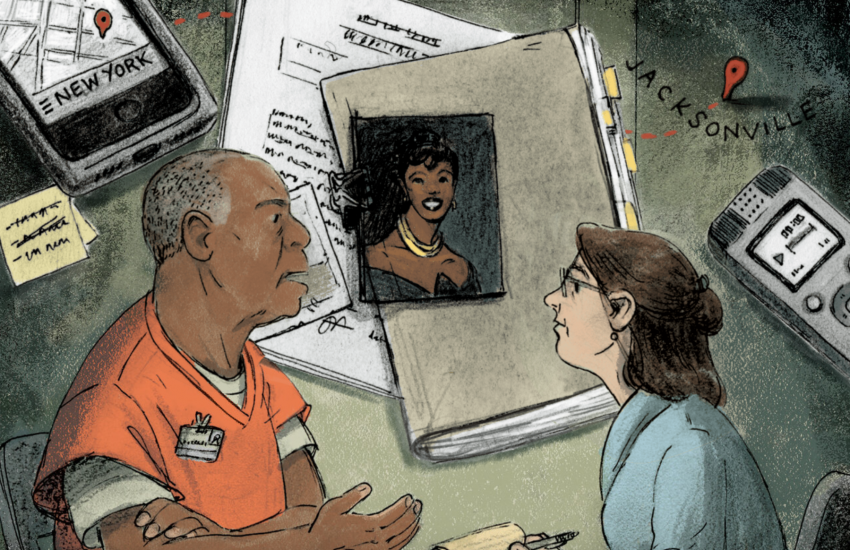How PRX Remix runs a never-ending stream of audio stories on shuffle
Charles Darwin’s worm behavior studies. Blacksmithing in modern America. Living with Asperger’s. These are a few of the immense number of audio stories found on PRX Remix, an experimental channel from PRX.
For audio producer Josh Swartz, the amount of podcasts out there is dizzying. “My first experience with Remix was as a listener before I was the curator,” he told Storybench. “I’m a chronic browser of music and movies, so when I started to get into podcasts I felt paralyzed by all the stuff to listen to.”
Swartz became hooked. “Remix cured me,” he said. “It provided me a way to love audio storytelling without the stress and extra time of browsing.” The simple interface of the website allows listeners to stream a diverse range of podcasts, from the hit show, The Moth, to one-off stories produced by high school students.
Now, as a curator of Remix, Swartz gets to unearth and showcase the best in short audio storytelling. We asked him to take us under the hood.

Why do you like audio as a storytelling medium?
There’s something magical about a medium that is at once so private and personal while at the same time being public. I think audio storytelling is at its best when it strikes that balance. That’s the short answer.
The longer answer is that my love for audio stems from the same impulse that led me to pursue film initially. I just love being a maker, producing content and telling nonfiction stories. There are serious limitations to the film medium, though. There’s huge time, energy, and financial costs associated with telling stories through film at every step of the way. I wanted to be closer to the stories I was telling – to remove as many logistical barriers as possible. Audio offers the type of intimate storytelling I was craving and so much more. For instance, I’m much more successful at having a real conversation with someone when there’s a handheld recorder between us as opposed to a whole film setup.
How did you get into podcasting?
My first audio stories ever were profiles of fellow students attending Middlebury College. I was studying film at the time, but really loved the freedom audio provided. So after graduation I had the motivation but needed more polished skills to do good audio work. I attended the Transom Story Workshop, a crash-course in audio storytelling led by Rob Rosenthal and Jay Allison, which led naturally to a career in public radio and podcasting. That was almost one year ago exactly. Since then I’ve done freelance work, started my own podcast and, of course, I started work at PRX curating Remix.

How did PRX Remix come about?
PRX Remix came about when PRX decided in 2009 or so to create a streaming channel, one that would deliver a new story-based format. Given PRX’s massive catalogue of independently produced works, we knew a curated selection could be super appealing – a “best of” approach of short-form works. Roman Mars, now of 99% Invisible, became the first Remix Curator. Soon after we created the Remix stream, XM came calling and they offered us a free channel. We hustled to integrate our production tool with their content management system and Remix on XM Channel 123 was born. Shortly thereafter, Spokane Public Radio in Washington State approached us: they had purchased a new broadcast signal and needed content to air. Spokane Public Radio became the first station to broadcast the PRX Remix stream 24/7 on a terrestrial signal … and still does to this day.
Why does it work?
Remix works because I’m able to select from a massive PRX catalog and attract other independent work – podcasts and others – who want to reach a broader audience. By curating for a specific range of short-form storytelling, we’re able to assemble “stories on shuffle” – a unique format that changes the order of stories because of a tuned algorithm. We’re also getting new content all the time, so while listeners will hear some favorites the mix is always fresh. The algorithm preserves the random nature of the stream and allows me to spend time diving deep in the PRX archives to find the best work for Remix.
How do you go about hunting and gathering these audio gems?
There’s a few things in my head when I’m searching for pieces. The first is length. Stories between three and 15 minutes are the sweet spot for Remix. Shorter pieces ensure Remix remains spontaneous and that people tuning in will hear a diversity of content. The second thing I’m thinking about is the story. Is it interesting? Told well? I’m looking for pieces with a narrative arc.
The third is to pay attention to how I’m feeling. Since I’m just one person, “listening fatigue” can be a factor. If I start to feel tired or distracted I take a break and go for a walk or something. Or I’ll listen as I walk, which is a preventative measure. To do my job well I have to listen to a lot of pieces and give each one a fair shake. The final thing I think about while hunting is the “X-factor.” The X-factor isn’t one thing, but something that makes the piece stand out. It could be a charming character, an important topic, beautiful sound design – of course the piece has to have all the elements to a good story but I’m also looking for something that stands out.
What is your biggest challenge working with PRX Remix?
My biggest challenge with Remix is not being able to listen to more work. I listen to pieces at regular speed so there’s only so many minutes of curating I can fit into a day. “Listening fatigue,” which I mentioned earlier, also plays into this. So I keep an ongoing wish-list of pieces I want to hear but haven’t yet had the time. There’s so much audio out there!
What advice do you have for journalism students wanting to get into audio?
My first piece of advice is to reach out to anyone who already works in the public radio or podcast world and with whom you have a connection. I’ve found the audio community to be extremely warm and generous to newcomers. … The audio landscape is totally in flux right now, which is exciting to be a part of, but it’s also confusing. So no worries if you don’t understand how things work, because the industry is changing so fast that most people who work in it don’t know much more than you do.
My second piece of advice: produce, produce, produce. Find spare time and make something. Don’t wait for permission, don’t slow down waiting for external validation, and don’t let the fact that you haven’t made something yet hold you up either. Just get out and do it. There’s never a bad time to start making radio. And no, there’s not a requirement in this line of work that you must have listened to NPR in the car as a kid (I didn’t) in order to be successful. However, it does help to have basic knowledge of how people who get paid to make audio do it, in which case transom.org is a great source for equipment and software recommendations and tips on process.
I recently started an independent podcast of my own called Bandwagon, currently featuring stories about people who support the Bernie Sanders campaign. The idea is to take an in-depth look at the people behind growing cultural phenomenons as they happen. I started on it last summer and it has grown to become an important, fulfilling, and productively challenging part of my life.

Check out PRX Remix here, on XM 123 and these stations across the country, and on the PRX Remix apps for iPhone and Android. If you’re a station interested in airing PRX Remix, request here.





